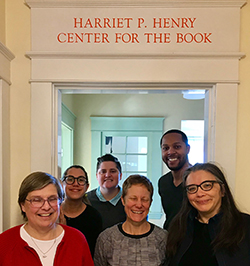

Hayden Anderson, Jan Bindas-Tenney, Jerome Bennett, Diane Magras, Karen Myrick, Nicole Rancourt, Meghan Reedy, Lizz Sinclair, Kyle Volland, Ian Watkins
Maine Humanities Council/Harriet P. Henry Center for the Book
Tell us a bit about yourself, the organization you represent, and the work you do.
We decided to respond as a staff because Tracy’s visit made such a difference across all of our programs. There are ten of us here at the Maine Humanities Council, the home of Maine’s Harriet P. Henry Center for the Book. We are a statewide, private non-profit organization and use the humanities—literature, history, philosophy, and culture—as a tool for positive change in Maine communities.
In fact, communities, books, and literature are at the heart of our work. MHC’s facilitated book groups offer Mainers opportunities to experience the power and pleasure of ideas by fostering critical thinking and conversations across social, economic, and cultural boundaries. We could not offer them without close partnerships with libraries, hospitals, school districts, adult education programs, correctional facilities, and other community organizations around the state.
Tell us about your community/the communities you serve, and your part of the country.
Maine inspires a strong sense of place for those who live here and for those who visit. This is not only due to the beauty of its landscape, but also its geographic location: Maine is in the northeastern-most corner of the country bordered by only one other state, the Gulf of Maine, and Canada. It is largely a rural state where nature is always just out the back door. People are devoted to the landscape where they live, the people they live their lives with, and the work they do to keep their communities going no matter what. We work closely with people in cities, towns, and territories large and small all over the state. Each community is different, and each is fiercely independent. Libraries are at the heart of most of the towns.
What did it mean to you and your community to host the U.S. Poet Laureate?
When we asked this of people who came to the conversations Tracy led, one person responded, “It meant everything.” That says it all, but we’ll try to explain a little more fully. Wherever Tracy visited, people could not believe that the U.S. Poet Laureate would come to Maine, much less visit their small town library, the correctional center they are in, or their high school leadership group. We can imagine Tracy responding, “Well, why wouldn’t I?” Her visit helped people here in the northeastern corner of the country feel seen, heard, and valued. After the conversation in Norway I overheard some folks describing Tracy as “my Poet Laureate” or “our Poet Laureate,” as they talked. The shift from using the to using the words my and our when referring to the U.S. Poet Laureate made me realize that her visit helped people feel included, invested, a part of something important, and a sense of pride. It also sparked a desire to read and talk about more poetry!
Her visit meant a lot to us as a staff, too. Reading what Tracy has written on the importance of poetry and the thinking behind the American Conversations project was so exciting for us. We immediately felt a deep kinship with her. She put words to so many thoughts we have had about our work, and how we want to go about it, but had not been able to articulate so clearly. “In order to get to community,” she says, “we have to go quiet, slow down, be vulnerable and brave, and approach one another with an idea as simple as I’m me, you’re you, we are not the same, and yet perhaps we can feel safe here together talking about something as simple as a poem.” This captures everything we are trying to do with our programs in communities across our state.
What, if any, type of literary programming do you present in your community? How did this program fit in?
We offer facilitated reading and discussion programs in partnership with communities large and small all over Maine, most of which meet four to five times over a given period of time. Some are offered to the general public, while others are for specific audiences, such as veterans, adults who are infrequent readers, and people working in education, health care, domestic violence prevention, and other professions whose critical work helping others can be emotionally demanding. All of the groups read poems, novels, short stories, and essays that do what literature does best—engage readers, raise big questions, and help people see through others’ eyes. Being in a place where people have the opportunity to have their thoughts heard and to hear the thoughts others have also helps group members develop a sense of community and shared exploration.
Over the next year, selections from “American Journal” and from Tracy’s poems and essays will be incorporated into every group’s reading list. We will also offer four-session discussion groups of the entire anthology for those who are interested. In this way, the conversations Tracy started here will continue as they engage more people across our state.
